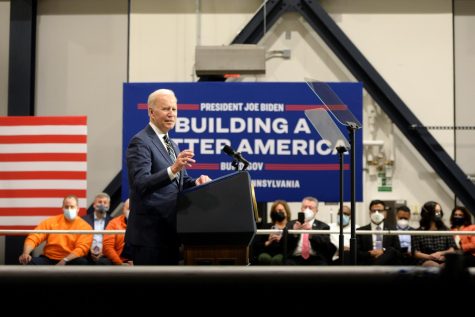Green: Baked beans the glue of American society
September 2, 2010
What does it mean to be American? Does it mean simply that I am a resident of the United States,… What does it mean to be American? Does it mean simply that I am a resident of the United States, or that “at least I know I’m free,” as one catchy ditty repeatedly insists? Does it mean I work out at a gym and then eat a Big Mac 20 minutes later? Does it mean I’m an individual, damn it, so don’t try to label me?
These are just some of the tough, revenue-altering questions that advertising companies, politicians and anyone else trying to influence the oh-too-willing wad of consumers and voters exposed to their bevy of carefully planted patriotic cues ponder every single day.
Why? Because people love being pandered to. And when pandering at the national level — especially one as large as the United States’ — one must condense 300 million people into a few images, products and ideas that create a culture of American-ness.
It’s been this way since the country first started to form its own identity, when our nation’s first settlers got really wasted on whiskey and threw a crap-ton of tea in the Boston Harbor. Even now, drinking tea is totally sissy and British-like. Real Americans drink coffee — just ask the delightfully side-parted David Shuster.
Some of these American icons, like coffee, have longevity, and yet others are passing fads, as short-lived as Beanie Babies, Tamagotchis and Joe Biden’s hair plugs.
Take baseball, for instance: our supposed national pastime. Almost 60 years ago, baseball was so important to the national morale that chewing gum mogul Philip K. Wrigley created a women’s baseball league, as documented by “A League of Their Own,” which is, of course, my go-to source for most baseball knowledge. But now, baseball is O-U-T, out! And football is way in. If you are trying to sell canned soup, it is absolutely vital to broadcast one of the Manning brothers slurping it up out of a red-white-and-blue mug.
There are, likewise, anti-American icons. Soccer has never been “in,” and — let’s just get real — never will be. It is just too European, and there’s nothing less American than being European. Did John McCain ever play soccer? Hell no, not with that once-chiseled all-American jaw and promising political career.
But then you have your classics. Like dogs. It is so American to have a dog. Why do you think so many politicians have them — or rent them, so it looks like they have them? Why do you think Bush’s Baked Beans makes those obnoxious commercials about a golden retriever betraying the details of the Bush Brothers’ beloved Midwestern family recipe? Why does Marmaduke continue to exist as a comic — and now, incredibly, as a movie — despite its worthless jokes and redundant illustrations?
Because, for whatever reason, many Americans feel that they are acting on their patriotic duty by buying spaghetti from a Labrador retriever with a cartoon voice.
Even more often than advertisers do, politicians blatantly and shamelessly utilize American symbols to sway prospective voters.
Sarah Palin really is the master of this technique. Everything from her clothes to her folksy accent to her mom-poof is a reflection — almost a parody — of average American living. On just the first few pages of a Google image search of Palin, and not counting pictures of Tina Fey or porn stars, you will find Palin posing with: a motorcycle, a gun, an abundance of American flag pins and a near-infinite supply of red clothing.
Perhaps this is why Palin has replaced Ann Coulter as the most-cherished of female conservative talking heads. Palin doesn’t just talk the talk, she walks the walk, shoots the duck and eats the gristle. Coulter, who is practically submerged in layers of eye makeup — seriously, how does she keep her eyes open with the weight of all that mascara — and speaks in the same Katharine Hepburn-esque lilt as Samantha from “Sex and the City,” has only her insane, egomaniacal beliefs and specious logic to get her by.
Such rationale for choosing something as momentous as our political leaders or even as inconsequential as our soap brand is obviously unsound. But America possesses a reflective culture, and it’s a two-way reflection. Marketing is reflective of the American idyll, and the American idyll is perpetuated by marketing, so much so that most of these American symbols persist only as hyperboles.
E-mail Molly at [email protected].







